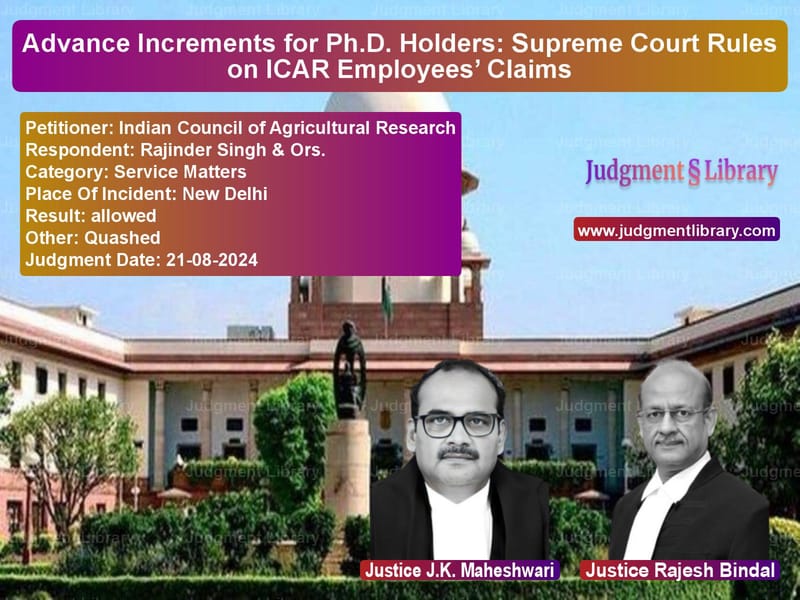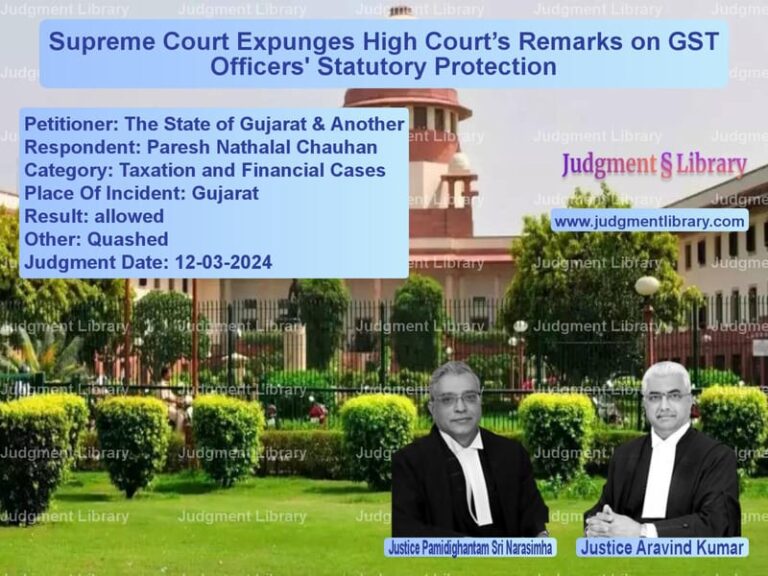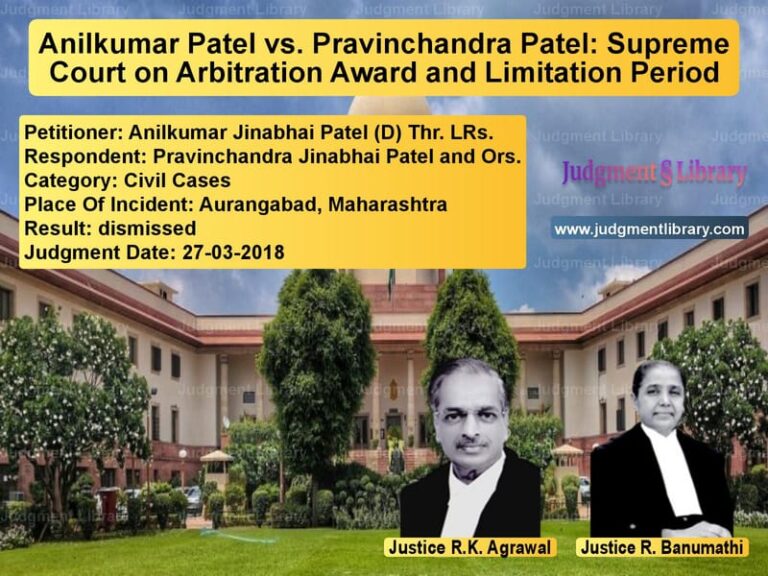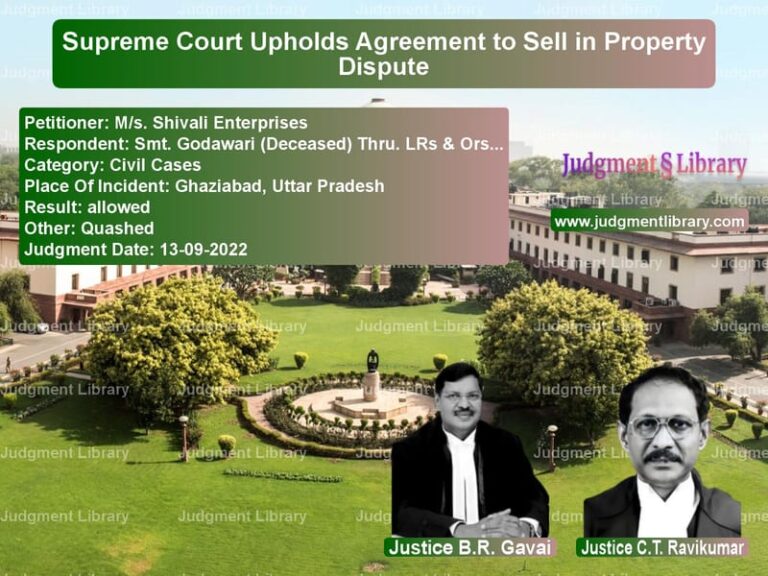Advance Increments for Ph.D. Holders: Supreme Court Rules on ICAR Employees’ Claims
The Supreme Court of India, in the case of Indian Council of Agricultural Research (ICAR) vs. Rajinder Singh & Ors., examined whether technical staff working in ICAR-affiliated institutions were entitled to advance increments upon obtaining a Ph.D. degree. The dispute arose from differing policies regarding incentives for acquiring higher educational qualifications within different cadres of ICAR employees.
The case centered on whether technical personnel, whose role supports research rather than conducting it, should receive the same benefits as scientists engaged in direct research. The Court ultimately ruled in favor of ICAR, setting aside earlier decisions that had extended the benefits of advance increments to technical staff.
Background of the Case
ICAR is a society registered under the Societies Registration Act, 1860, and is responsible for agricultural research in India. The organization created two distinct services in 1975:
- Agricultural Research Service (ARS): Engaged in research and governed by a specific set of service rules.
- Technical Service (TS): Supporting research through technical work, governed by a different set of rules.
In 1999, ICAR revised pay scales following the recommendations of the Fifth Central Pay Commission. A circular issued on February 27, 1999, introduced incentives for acquiring Ph.D. and M.Phil. degrees for scientists working in the ARS. Clause (ii)(d) of the circular stated:
“A Scientist will be eligible for two advance increments as and when he acquires a Ph.D. degree in his service career.”
The dispute arose when technical personnel working in the Indian Agricultural Research Institute (IARI), a unit of ICAR, sought similar benefits upon obtaining Ph.D. degrees. They filed applications before the Central Administrative Tribunal (CAT), which ruled in their favor. ICAR challenged this decision before the Delhi High Court, which upheld the CAT’s ruling. Aggrieved by the decision, ICAR appealed to the Supreme Court.
Arguments of the Parties
Arguments by ICAR (Appellant)
- The incentives for Ph.D. were specifically introduced for scientists in ARS, not technical personnel.
- Technical personnel and scientists belong to different cadres with separate service rules, qualifications, and recruitment procedures.
- Technical staff are not directly engaged in research but support it, making them ineligible for incentives designed for scientists.
- ICAR’s Study Leave Regulations, 1991, which allowed technical personnel to pursue Ph.D. studies, did not include provisions for advance increments.
- Pay scales and benefits for technical personnel were determined separately from those of scientists and followed Central Government recommendations.
Arguments by Respondents (Technical Personnel)
- Both scientists and technical personnel contribute to research, making it unfair to deny the latter the same incentives.
- ICAR’s policies had previously allowed technical personnel to be considered for lateral entry into the scientist cadre upon obtaining a Ph.D.
- The Study Leave Regulations permitted technical personnel to pursue Ph.D. studies, which implied an expectation of career benefits.
- A circular issued in 1995 allowed technical personnel with Ph.D. degrees to be included in research papers and projects, showing their significant contribution to research.
Supreme Court’s Observations
The Supreme Court considered the classification of ICAR employees and the justification for different incentive structures for scientists and technical personnel. The Court made the following observations:
- “The Tribunal and High Court have erred by equating technical personnel and scientists and granting respondents advance increments to which they are not entitled to.”
- “Technical personnel merely assist in research but do not conduct independent research as scientists do. Their service conditions and pay structures are separate, and incentives for one cadre cannot be automatically extended to another.”
- “Merely acquiring a Ph.D. does not entitle technical personnel to financial benefits meant for scientists. Different job roles warrant different treatment in service matters.”
- “The Study Leave Regulations only permitted technical personnel to enhance their qualifications but did not promise any financial incentives upon doing so.”
- “Pay scales and benefits are determined based on cadre-specific job responsibilities and cannot be equated arbitrarily. The argument under Article 14 of the Constitution (Right to Equality) is not applicable in this case.”
Final Judgment
The Supreme Court ruled in favor of ICAR, setting aside the decisions of the CAT and the Delhi High Court. The Court held:
- Technical personnel are not entitled to advance increments for acquiring a Ph.D. since such benefits were specifically meant for scientists.
- The Original Applications filed by the respondents before the Tribunal were dismissed.
- The differentiation in incentives between scientists and technical personnel is legally valid and does not violate Article 14.
- ICAR’s pay structure and benefit policies for different cadres must be respected.
Implications of the Judgment
This ruling reinforces the principle that financial incentives and career benefits must align with specific job roles and responsibilities. The judgment:
- Clarifies that incentives granted to one cadre cannot be automatically extended to another.
- Upholds the distinction between scientific research and technical support roles within ICAR.
- Reaffirms that service conditions and benefits are determined based on job responsibilities and are not subject to blanket application across cadres.
- Establishes that Study Leave Regulations do not imply entitlement to financial incentives.
The ruling is a significant precedent in service law and employment disputes, particularly in cases where employees seek parity in benefits without considering cadre-specific policies. It ensures that incentives and financial rewards remain aligned with the intended job functions, maintaining clarity and fairness in service structures.
Petitioner Name: Indian Council of Agricultural Research.Respondent Name: Rajinder Singh & Ors..Judgment By: Justice J.K. Maheshwari, Justice Rajesh Bindal.Place Of Incident: New Delhi.Judgment Date: 21-08-2024.
Don’t miss out on the full details! Download the complete judgment in PDF format below and gain valuable insights instantly!
Download Judgment: indian-council-of-ag-vs-rajinder-singh-&-ors-supreme-court-of-india-judgment-dated-21-08-2024.pdf
Directly Download Judgment: Directly download this Judgment
See all petitions in Employment Disputes
See all petitions in Promotion Cases
See all petitions in Recruitment Policies
See all petitions in Judgment by J.K. Maheshwari
See all petitions in Judgment by Rajesh Bindal
See all petitions in allowed
See all petitions in Quashed
See all petitions in supreme court of India judgments August 2024
See all petitions in 2024 judgments
See all posts in Service Matters Category
See all allowed petitions in Service Matters Category
See all Dismissed petitions in Service Matters Category
See all partially allowed petitions in Service Matters Category







